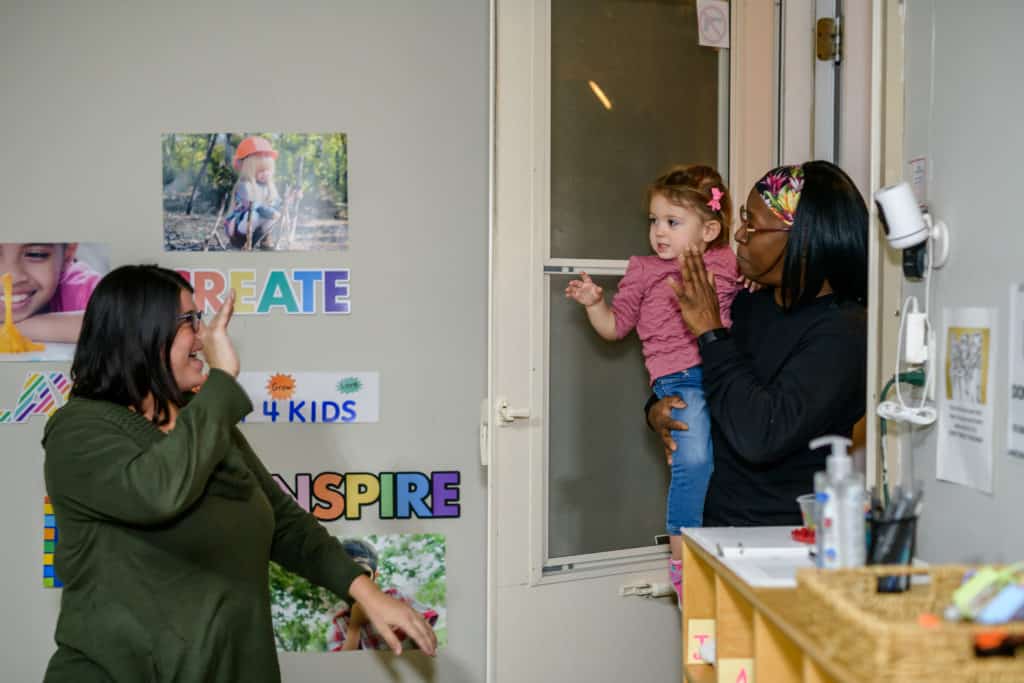Millions of Americans work nights, weekends, or on federal holidays when 92 percent of child care centers are closed. We take for granted that firefighters and police officers are keeping our communities safe while we sleep. We count on doctors, nurses, and EMTs to handle emergencies and routine care even at 2 a.m. These essential workers are parents too. Who is taking care of their kids?
For many parents who work non-traditional hours, home-based child care is the best choice because home-based programs are flexible, accessible, and create a nurturing family atmosphere where children can play and sleep comfortably. Because home-based providers, including both licensed family child care and license-exempt family-friend-and-neighbor (FFN) caregivers, typically have just a few children at one time, they can be more flexible about when children arrive and leave. For those on tight schedules, including single parents, accessibility is also a concern. Many choose home-based providers who live right in their own neighborhood, where they can get home easily after a busy night shift.
“Parents are comfortable telling me what their challenges are,” says Carolina Hernandez, a FFN provider in Phoenix, Arizona. “They choose me because I’m flexible and they trust me. I recently changed my hours to accommodate a couple of children whose moms are cleaning houses in the evenings and on Saturday mornings. I don’t charge more after 6 p.m. unless they come to pick up later than we agreed on.”
Carolina’s clients also choose her because she creates a comfortable family atmosphere for the children in her care. “In the evenings or weekends, coming to my child care is not like school. We wash our hands together, eat dinner as a family, play games together, and read books. It is much more relaxed than during the regular weekday hours, just as it should be for kids at home.”
The scarcity of child care openings for non-traditional workers is exacerbated by the fluctuating employment landscape during the COVID-19 pandemic. More workers are working from home, on shifting schedules, working multiple jobs to make ends meet, or working part-time to accommodate school-age children with unpredictable school schedules due to closures and quarantines. Many child care centers won’t hold part-time or occasional child care spots that can easily be filled by full-time families with 9-5 schedules. Furthermore, According to the Urban Institute, those on the night shift are also more likely to be Black, Latinx, or multiracial, to have lower incomes, lower levels of education and to be parenting single-handedly. All of these factors make home-based providers who care for children during nontraditional hours even more essential.
Keisha Bailey, a nurse in Aurora, Illinois who clocks into work early and sometimes works overtime because the hospital is short-staffed, was delighted to find Pam Childress, a licensed home-based child care provider, who allows her to bring her son to school as early as 5 a.m. and when necessary pick him up after seven. Keisha also has a 9-year-old daughter whose school closed temporarily during the pandemic. “Ms. Pam stepped right in and took my daughter during the day so that she could do her online learning from Ms. Pam’s. Having both of my children in one place and well cared for was a real God-send.”
Pam also cares for a child whose mother, a single mom and medical technician at the hospital, has worked three night shifts a week for the past seven years. On those nights Jennifer’s son Jayce sleeps, gets breakfast, and does his spelling homework at “aunt Pam and uncle John’s,” whose house is just a few minutes drive from the hospital. “Pam got a special nighttime license to care for Jayce, and the stability she’s provided has really made a difference when things have been chaotic in my work schedule and family life. She has provided a sense of safety and continuity at a much more affordable price than when I was hiring a babysitter to come to my house every night.” As Jayce has gotten older and moved on to school and afterschool programs, Pam has been a steady presence in his childhood.
Both Pam and Carolina stress that the main reason many families prefer home-based providers is because the children and their caregivers develop strong relationships that make kids feel safe, happy, and confident. They offer a level of stability that is uncommon in other programs with frequent turnover of employees. Keisha raves about how prepared her son is for kindergarten because of Pam’s steady guidance. “Ms. Pam knows him really well because he’s been going to her since he was 9 months old. She teaches the kids how to wash their hands and cough into their arms. She teaches them how to get along with each other. And she taps right into his learning abilities and encourages him to learn the things he’ll need for kindergarten,” she says.
Carolina notes that this level of trust is built on the fact that she cares for her clients’ children “the same way I would my own children. I really love being able to play games with them, do arts and crafts, and read. I don’t just care for them, I educate them. At heart, I’m a teacher.”
Caring for and teaching children with compassion and wisdom is the winning combination parents are seeking. For those whose work routines and schedules are especially stressful, “having a child care provider who is like family allows you to sleep in the few hours you actually get to spend in your bed,” adds Keisha. “Ms. Pam is the blessing of my life. Because of her, I can rest easy and know my son is getting the love he deserves when he’s there and when he’s with me.”
The flexibility, accessibility, stability and nurturing relationship home-based caregivers offer provides an essential service that keeps workers (and our economy) afloat. As the nation continues to reboot when and how we work and parent, let’s be sure to value and support the many ways that home-based care providers allow us all to rest easy knowing that the world keeps working while we sleep.




